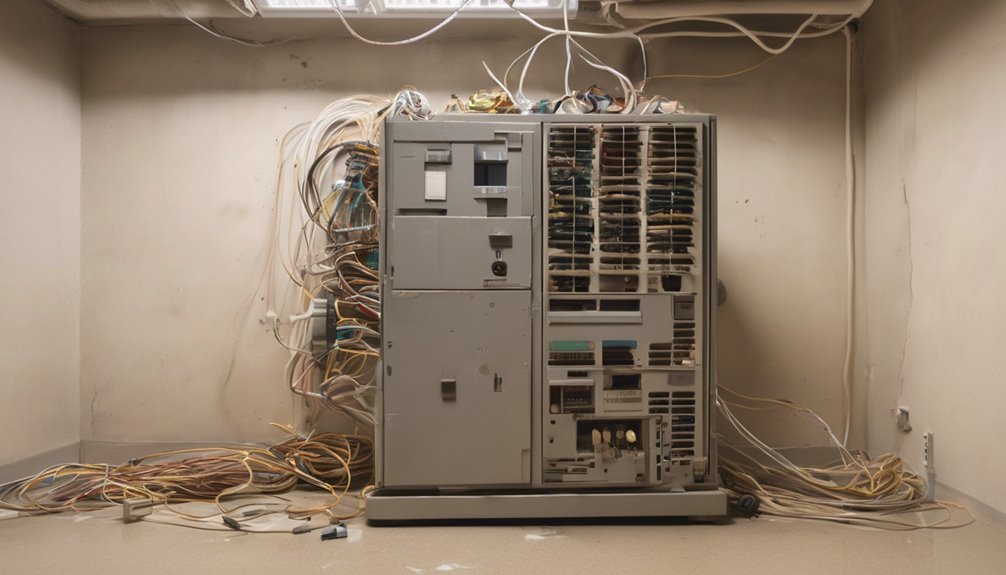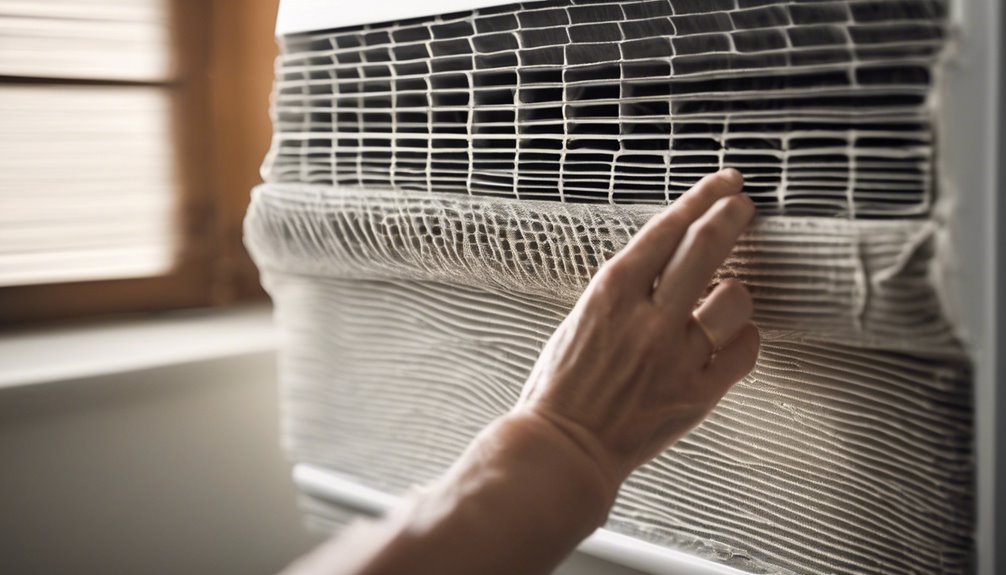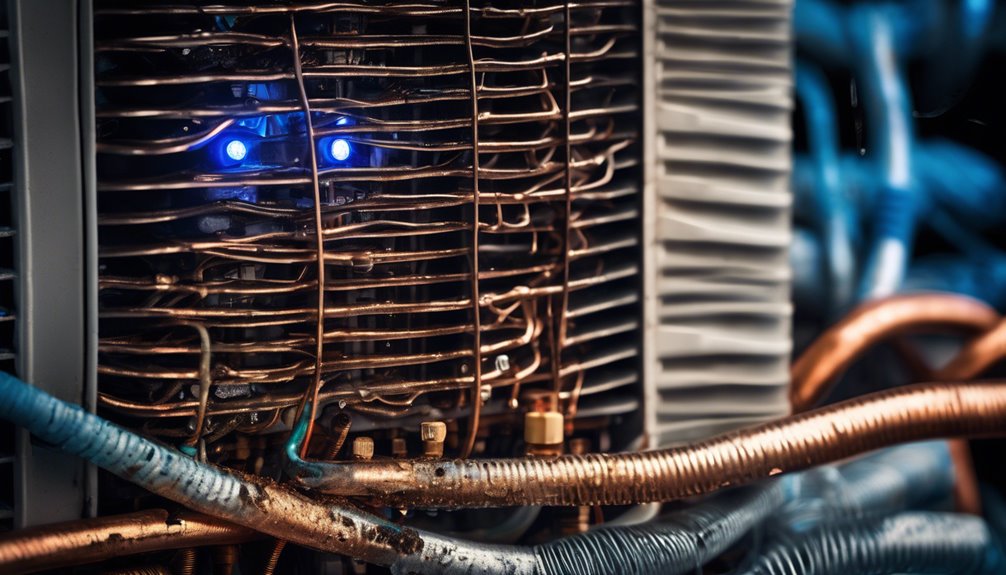Your AC tripping the circuit breaker is a red flag that something's amiss. It could be an AC system overload, high voltage supply, or faulty electrical components, which can lead to safety risks, increased energy bills, and reduced system lifespan if left unaddressed. Refrigerant leaks, overheating compressors, and faulty capacitors or contactors might be the culprits. To get to the root of the issue and prevent further problems, you'll want to investigate these potential causes further.
Key Takeaways
- AC tripping can be caused by electrical issues, faulty components, airflow obstructions, thermostat malfunctions, and refrigerant leaks.
- Refrigerant leaks and electrical surges can lead to electrical overload risks, causing circuit breaker trips.
- Faulty capacitors and contactors can disrupt AC operation, leading to tripping issues, and require replacement to resolve the problem.
- Blocked airflow and frozen coils can put excessive strain on the AC system, causing tripped breakers, and regular maintenance can prevent this.
- Regular compressor cleaning, filter cleaning, and vent checks can help prevent AC tripping issues and ensure efficient cooling.
Overheating Compressor
When your air conditioner's compressor overheats, it's like a ticking time bomb waiting to trip the circuit breaker.
This can happen when dirt and debris accumulate on the compressor coils, blocking airflow and causing the compressor to work harder.
Regular compressor cleaning can prevent this issue. Make it a habit to clean your compressor coils every month, especially during peak summer months.
Additionally, schedule annual compressor maintenance with a professional to ensure your AC is running efficiently.
A well-maintained compressor reduces the risk of overheating, which in turn prevents the circuit breaker from tripping.
Refrigerant Leaks and Electrical Issues
You're probably aware that refrigerant leaks can cause your AC to trip the circuit breaker, but do you know why?
It's because refrigerant leaks can lead to electrical overload risks, and if you don't identify the faulty components, you'll be stuck with a broken AC.
Refrigerant Leak Detection
Refrigerant leaks can sneak up on you, hiding behind a veil of seemingly normal AC operation, only to trip the circuit breaker and leave you sweltering in the heat.
You mightn't even notice anything's wrong until it's too late. That's why refrigerant leak detection is crucial.
You can use leak testing methods like the bubble test or dye injection to identify leaks. Another option is refrigerant sniffing, which involves using a specialized device to detect the refrigerant's unique odor.
Electrical Overload Risks
Because refrigerant leaks often go undetected, they can lead to a buildup of electrical resistance in your AC's system, which in turn increases the risk of electrical overload. This can cause your circuit breaker to trip, disrupting your cooling comfort. When your AC's electrical components are working harder to compensate for the leak, they consume more power, leading to an electrical surge. This surge can be strong enough to trip your circuit breaker, shutting down your AC.
| Causes | Effects | Risks |
|---|---|---|
| Refrigerant leaks | Increased electrical resistance | Electrical overload |
| Increased power consumption | Electrical surge | Circuit breaker trip |
| Overworked electrical components | System failure | Fire hazard |
Faulty Component Identification
When your AC's circuit breaker trips, it's essential to identify the faulty component quickly to prevent further damage and ensure your cooling system is up and running again.
You'll need to perform component testing to pinpoint the issue. Start by checking the electrical components, such as capacitors, contactors, and relays, for signs of wear or damage.
If you're not comfortable with electrical diagnosis, it's best to call a professional. They'll use specialized tools to detect refrigerant leaks or electrical issues that might be causing the tripped circuit breaker.
Faulty Capacitors and Contactors
When you're troubleshooting AC tripping issues, you'll want to inspect the capacitors and contactors, as they're common culprits behind the problem.
You might notice symptoms like reduced airflow, strange noises, or burning smells, which could indicate capacitor failure. By understanding the causes of contactor malfunction and knowing how to replace faulty components, you can get your AC system running smoothly again.
Capacitor Failure Symptoms
You've probably noticed that your AC is tripping the circuit breaker more frequently than usual, and you're wondering what's causing the problem.
Well, faulty capacitors can be the culprit. Over time, capacitor wear and capacitor corrosion can lead to a decrease in the capacitor's ability to store energy.
This can cause your AC to draw more power than usual, tripping the circuit breaker. Other symptoms of capacitor failure include humming or buzzing sounds from the AC unit, reduced airflow, and increased energy bills.
If you notice any of these signs, it's likely that your capacitor is failing and needs to be replaced.
Contactor Malfunction Causes
A faulty capacitor can also cause contactor malfunction, leading to your AC tripping the circuit breaker.
When a capacitor fails, it can disrupt the contactor's timing, causing it to malfunction. This can lead to electrical surges that trip the circuit breaker.
You might notice that your AC is turning on and off rapidly, or that it's not turning on at all. In some cases, you might even hear a humming or buzzing noise coming from the contactor.
If you suspect a faulty capacitor is causing your AC to trip the circuit breaker, it's essential to investigate further. A malfunctioning contactor can cause significant damage to your AC system, so don't ignore the signs.
Replacing Faulty Components
Two faulty components are often to blame for AC tripping the circuit breaker: capacitors and contactors. Over time, these components can wear out, causing your AC to malfunction. Faulty designs or manufacturing defects can also lead to premature failure. If you suspect a faulty capacitor or contactor, it's essential to replace them to prevent further damage to your AC unit.
| Component | Symptoms | Solution |
|---|---|---|
| Capacitor | AC won't turn on, humming noise | Replace with a compatible capacitor |
| Contactor | AC trips frequently, burning smell | Replace with a compatible contactor |
| Capacitor | AC running inefficiently, high bills | Check for worn-out or damaged capacitor |
| Contactor | AC not cooling, clicking noise | Check for faulty or stuck contactor |
Tripped Breakers and Fuses
Tripped breakers and blown fuses are a frustrating yet common occurrence in many homes.
You're not alone if you've experienced this issue with your AC unit. When an electrical surge occurs, it can cause a tripped circuit, leading to a blown fuse or tripped breaker.
This happens when the electrical current flowing through the circuit exceeds the safe limit, triggering the breaker or fuse to shut off the power supply.
It's a safety mechanism designed to prevent electrical fires or damage to your appliances.
If you're experiencing frequent tripped breakers or blown fuses, it may indicate a more serious issue with your AC unit or electrical system.
Thermostat Malfunctions and Miscalibrations
Your thermostat is the brain of your AC system, responsible for regulating the temperature and ensuring your home remains comfortable.
However, it's not immune to malfunctions and miscalibrations that can cause your AC to trip the circuit breaker. If your thermostat is faulty, it may send incorrect signals to your AC, leading to overheating or overcooling, which can trip the breaker.
A faulty thermostat can send incorrect signals, causing overheating or overcooling that trips the circuit breaker.
Check if your thermostat needs a reset or if it's experiencing calibration issues. A thermostat reset can resolve the problem, but if the issue persists, you may need to replace the thermostat or have it recalibrated by a professional.
Addressing thermostat malfunctions and miscalibrations can prevent your AC from tripping the circuit breaker and ensure uninterrupted cooling.
Blocked Airflow and Frozen Coils
How often do you check the air vents and coils of your AC system?
If it's not often, that might be why your AC is tripping the circuit breaker. Blocked airflow and frozen coils can put excessive strain on your system, causing it to overheat and trip the breaker.
Dirty filters and clogged vents are common culprits, restricting airflow and causing the coils to freeze. Make sure to clean or replace your filters regularly and check for any blockages in your vents.
Also, ensure that your outdoor unit has enough clearance from surrounding objects, as this can also impede airflow. By keeping your system clean and clear, you can prevent blocked airflow and frozen coils from causing your AC to trip the circuit breaker.
Frequently Asked Questions
Can a Dirty Air Filter Cause My AC to Trip the Circuit Breaker?
You're wondering if a dirty air filter is the culprit behind your AC's circuit breaker tripping. Yes, it's possible! A dirty filter reduces filter efficiency, causing airflow restriction, which can lead to increased pressure and electricity usage, ultimately tripping the breaker.
Will a Tripped Circuit Breaker Damage My Air Conditioning Unit?
You're wondering if a tripped circuit breaker will damage your AC unit. Fortunately, a single trip won't cause harm, but repeated breaker overload or electrical surge can lead to internal component damage over time.
Can I Reset the Circuit Breaker if It Trips Due to AC Usage?
You can reset the circuit breaker if it trips due to AC usage, but first, ensure you've identified the cause; then, follow the reset protocol, and consider adjusting breaker sensitivity to prevent future trips.
How Often Should I Inspect My AC Unit to Prevent Circuit Breaker Trips?
You should inspect your AC unit regularly to prevent issues. Perform seasonal checks to ensure it's running efficiently. Check filters, coils, and wiring for damage or wear, and make adjustments as needed to avoid circuit breaker trips.
Are There Any Specific Circuit Breaker Types Recommended for AC Units?
When choosing a circuit breaker for your AC unit, you'll want to consider Arc Fault breakers, which detect and interrupt electrical arcs, and ensure the breaker's Circuit Capacity matches your unit's power requirements to prevent trips.
Conclusion
So, you've figured out why your AC keeps tripping the circuit breaker. It's likely due to one of these common issues: overheating compressor, refrigerant leaks, faulty capacitors or contactors, tripped breakers or fuses, thermostat malfunctions, or blocked airflow and frozen coils. Now that you know the possible causes, it's time to take action. Fix the problem and get your AC running smoothly again. Don't let a preventable issue leave you sweating all summer long!



